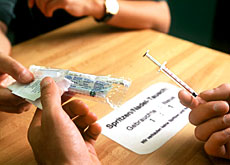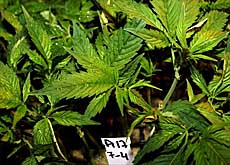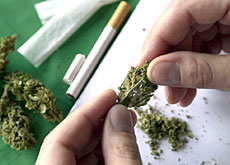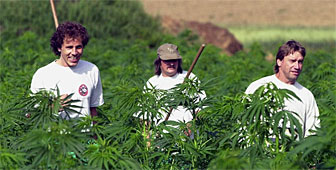UN criticises Swiss drugs policies

Switzerland is among several European countries to have come under fire for its liberal drug policies during a United Nations conference on narcotics.
Health officials at the meeting in Vienna were divided on whether repressive or liberal policies work best.
The head of the conference, Patricia Olamendi, called on countries to abandon what she called lenient and inconsistent policies toward cannabis and other drugs.
According to Thomas Zeltner, head of the Swiss Federal Office of Public Health, Switzerland’s attitude to drugs came under fire at the meeting.
“Some elements of Swiss drug policy and specifically policies that deal with harm reduction programmes, such as syringe exchange and the establishment of injection rooms, had been criticised,” Zeltner told swissinfo.
But Zeltner said the Swiss were not alone in being singled out by the UN’s International Narcotics Control Board (INCB).
Olamendi also criticised several other European countries’ drug policies, including Germany and the Netherlands.
However, the UN indicated it had no intention of harmonising laws internationally to combat the illegal use of drugs.
Liberal policies
Zeltner said Switzerland, as well as Germany, the Netherlands and Belgium, believe that more liberal policies are necessary to deal with crises such as the Aids epidemic.
“In Switzerland, we feel a heroin programme is something we need, but its not something that we feel all other countries need to copy,” Zeltner said.
He added that the number of countries looking for new ways to deal with drug problems was growing, particularly in western Europe.
Countries such as the United States and Sweden, took a less liberal stance toward drugs, however.
Washington is pushing for so-called integrated programmes that fight terrorism, poverty and drug abuse.
Possession of small amounts of cannabis in Switzerland is now only a minor offence, but in countries such as the United States it is consdiered a serious crime.
Cannabis tax
Zeltner raised some eyebrows at meeting, suggesting a tax for cannabis, which would be introduced following a vote on the decriminalisation of the drug.
“The INCB has voiced their concerns about the tax and we will continue discussions on this issue,” Zeltner said.
Most countries could agree, however, that the UN goal of attaining a drug-free world by 2008 – put forward five years ago – would remain a dream.
swissinfo, Karin Kamp
In 1999, about 16,000 patients were on methadone treatment in Switzerland.
During the same year, about 1,000 patients were in heroin-assisted therapy.
At the end of the 1990s, about 20 per cent of people aged 15 to 59 had taken cannabis at least once.
Delegates at a UN conference on narcotics have put pressure on Switzerland to reconsider its stance on both soft and hard drugs.
Switzerland argues that some of its liberal policies are needed to deal with the Aids epidemic.
The Swiss parliament is currently debating the possible decriminalisation of cannabis.

In compliance with the JTI standards
More: SWI swissinfo.ch certified by the Journalism Trust Initiative



You can find an overview of ongoing debates with our journalists here. Please join us!
If you want to start a conversation about a topic raised in this article or want to report factual errors, email us at english@swissinfo.ch.